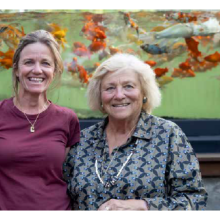Quicker computers with qubits
Dr. Serge Rosenblum is all about qubits—a fundamental platform for quantum information processing
New scientists

Very tiny objects—on the scale of atoms and electrons—behave in strange ways that do not conform to the laws of classical physics. But few people are aware that such “quantum weirdness” can also apply to objects big enough to be seen with the naked eye.
Such quantum states are the focus of Dr. Serge Rosenblum’s research. He studies qubits—a fundamental platform for quantum information processing.
Compared to classical computing’s binary language of zeroes and ones, qubits have a much richer vocabulary: each individual qubit can be a zero, a one, or a superposition of zero and one at the same time. This could lead to the development of processors capable of solving certain problems millions of times faster than today’s computers.
The qubits that Dr. Rosenblum investigates include materials that are colder than temperatures found in outer space. Called superconducting qubits, they have the advantage of encoding data with no electrical resistance. IBM and Google are focusing intense research on superconducting qubits, in the hope that they will lead to the “scaled up” architecture needed for future quantum computing.
While a PhD student in the Weizmann laboratory of Prof. Barak Dayan of the Department of Chemical and Biological Physics, Dr. Rosenblum led a team that developed a method for manipulating individual photons. Called Single-Photon Raman Interaction, or SPRINT, this system made it possible to propel photons selectively in one of two directions, creating the world’s first photonic “router.” Later, Dr. Rosenblum (who also completed a postdoc in the Dayan lab) increased the lab’s photon manipulation repertoire, showing how atoms can be activated to “snatch” individual photons from a light beam, and also how photon-atom interaction can form the basis of a “logic gate” for quantum computation.
In a second postdoc at Yale University, Dr. Rosenblum took aim at another challenge that prevents the construction of large-scale quantum processors: the problem of error propagation in quantum systems.
Bio
A native of Belgium, Dr. Serge Rosenblum completed his BA in physics and BSc in electrical engineering simultaneousy, earning both of these degrees summa cum laude from the Technion-Israel Institute of Technology in 2008. He remained at the Technion for his MSc in quantum optics (2010), then moved to the laboratory of Prof. Barak Dayan in the Weizmann Institute Department of Chemical and Biological Physics, where he completed his PhD in 2014. After serving as a postdoctoral fellow in the Dayan lab, Dr. Rosenblum undertook a second postdoc at Yale University’s Department of Applied Physics, under the supervision of Prof. Robert Schoelkopf.
Dr. Rosenblum is the winner of the John F. Kennedy PhD Excellence Award (2015), the Weizmann Institute’s highest academic honor for students. At the Technion, he earned the Norman and Barbara Seiden Family Prize (2008), a Dean’s Excellence Scholarship (2007), and was named to the President’s Honor List every semester of his studies.
Dr. Rosenblum speaks six languages (Dutch, French, English, Hebrew, Yiddish, and Swedish).








